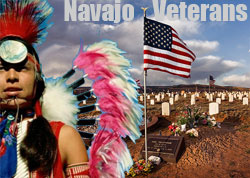 By Alysa Landry
By Alysa Landry
NAVAJO NATION — Access to treatment for Post-Traumatic Stress Disorder is expected to be easier for Navajo veterans following an agreement signed recently between the Navajo Area Indian Health Service and the Northern Arizona Veterans Affairs Health Care System.
The agreement calls for social workers to operate from the Fort Defiance Hospital and the Chinle Veterans Center, both of which are in the Arizona portion of the 27,000-square-mile Navajo Nation.
But the services likely will be available to any Navajo veteran who needs help, IHS spokeswoman Jenny Notah said.
"In terms of the service area and the services provided, it’s open to anyone enrolled in the northern Arizona catchment area," she said. "But we won’t turn away anybody if they show up for services."
Thousands of combat veterans are diagnosed every year with Post-Traumatic Stress Disorder, a term used to describe the psychological and physical symptoms experienced by as many as 40 percent of all combat veterans.
An estimated 25 million United States soldiers don’t leave war on the battlefield. Veterans who suffer from PTSD often experience nightmares, flashbacks and exaggerated startle responses — the phenomenon that sends veterans scrambling for shelter during fireworks displays or other unexpected explosions.
"PTSD is the only disorder that comes from outside your body or your mind," said George Lawson, one of the two social workers directed to provide services on the reservation. Lawson, a licensed clinical social worker and member of the Veterans Affairs’ PTSD Outreach Team, is based at the Fort Defiance Hospital.
"Other disorders may be due to a chemical imbalance inside the body, but PTSD comes from being exposed to a traumatic environment or war zone," he said. "Most veterans feel like there’s something wrong with them. Family or friends will say to get over it. A counselor would not say that. It would be like erasing a part of a person’s life experience."
Lawson said he serves about 20 clients per week, including veterans of the Korean, Vietnam and
Persian Gulf wars and World War II. Many of the World War II veterans seeking services never sought help.
Lawson did not have information on the number of American Indian veterans suffering from PTSD, but he said the problem is substantial.
"Tapping the numbers is difficult," he said. "That’s part of why we’re here. We know the numbers are here, we just don’t know how great they are."
The other Veterans Affairs-funded social worker is Ruthie Hunter, who eventually will provide services at the Chinle Comprehensive Health Care Facility.
Notah did not have information on a similar agreement to be signed with the New Mexico or Utah Indian Health Services and the states’ Veterans Affairs offices.
"Our primary work has been with the Prescott (Ariz.) Veterans Affairs office," she said. "However, that doesn’t prevent us from doing any outreach with New Mexico partners. At this time, I think the veterans are just beginning to learn about this service. The agreement marks a great opportunity for them to access these workers at closer distances."
Calls to Floyd Vasquez, spokesman for the New Mexico VA Health Care System, were unreturned this week.
The health care agreement, spearheaded by the Northern Arizona Veterans Affairs Health Care Center, came on the heels of a federal Veterans Affairs grant, spokeswoman Ame Callahan said. The grant allows VA employees based in the Prescott, Ariz., area to provide counseling and services in the remote locations on the reservation.
"What we wanted to do was provide more outreach to Native Americans because they’re in such a rural area," Callahan said. "The reservation is so far away from facility. We wanted to take the services to them instead of them having to travel a long way to us."
The agreement also called for the IHS to provide office space for the social workers. The counselors will work in the hospitals, within existing facilities.
"That’s a big deal for us because office space is so hard to find," Callahan said. "With the grant, we put social workers out there to provide services for PTSD, to do counseling, to do one-on-one work with people who need it."
The two social workers also will provide additional services such as applying for enrollment with Veterans Affairs, access to other health care options, benefits counseling or applying for disabilities.
The Northern Arizona Veterans Affairs Health Care System also has plans to expand services to the Hopi Nation, Callahan said.
The goal of the outreach program is to assist any veterans exhibiting symptoms of Post-Traumatic Stress Disorder, especially the young generation returning from Iraq or Afghanistan after serving multiple tours of duty, she said.
"Anyone can walk in as long as they’re veterans," Callahan said. "We also have family members participate. We want to get the younger folks who just came back from the war, and the elders who can say they’ve been through it. We want people to feel safe talking about it."
Alysa Landry:
Zimbio Pilot.com
ATTENTION READERS
We See The World From All Sides and Want YOU To Be Fully InformedIn fact, intentional disinformation is a disgraceful scourge in media today. So to assuage any possible errant incorrect information posted herein, we strongly encourage you to seek corroboration from other non-VT sources before forming an educated opinion.
About VT - Policies & Disclosures - Comment Policy



